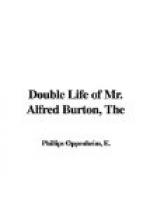“You are such a sentimentalist, dear,” she whispered. “You need have no share in the commercial part of this. The money can simply keep you while you write, or help you to travel.”
“It will lead that other fellow,” he groaned, “into no end of mischief.”
The professor and Mr. Bomford returned. They talked for a little time together and then the party broke up. As they waited for Edith to get her cloak, Burton spoke the few words which they were both longing to hear.
“Mr. Bomford,” he announced, “and professor, I should like to see you to-morrow. I am going to think over this matter to-night once more. It is very possible that I may see my way clear to do as you ask.”
“Mr. Burton, sir,” the professor said, grasping his hand, “I congratulate you. I felt sure that your common sense would assert itself. Let me assure you of one thing, too. Indirectly you will be the cause of marvelous discoveries, enlightening discoveries, being made as to the source of some of that older civilization which still bewilders the student of prehistoric days.”
Mr. Bomford had less to say but he was quite as emphatic.
“If you only think hard enough, Mr. Burton,” he declared, “you can’t make a mistake.”
He saw them into the motor, Edith in a cloak of lace which made her seem like some dainty, fairylike creature as she stepped from the pavement into a corner of the landaulette. Afterwards, he walked with uplifted heart through the streets and back to his rooms. He let himself in with a mechanical turn of the key. On the threshold he stood still in sudden amazement. The lights were all turned on, the room was in rank disorder. Simmering upon the hearth were the remains of his novel; upset upon the table several pots of paint. Three chairs were lashed together with a piece of rope. On a fourth sat Alfred, cracking a home-made whip. His hands were covered with coal-dust, traces of which were smeared upon his cheeks. There were spots of ink all down his clothes, his eyes seemed somehow to have crept closer together. There were distinct signs of a tendency on the part of his hair to curl over a certain spot on his forehead. He looked at his father like a whipped hound but he said never a word.
“What on earth have you been doing, Alfred?” Burton faltered.
The boy dropped his whip and put his finger in his mouth. He was obviously on the point of howling.
“You left me here all alone,” he said, in an aggrieved tone. “There was no one to play with, nothing to do. I want to go back to mother; I want Ned and Dick to play with. Don’t want to stop here any longer.”
He began to howl. Burton looked around once more at the scene of his desolation. He moved to the fireplace and gazed down at the charred remnants of his novel. The boy continued to howl.
CHAPTER XXIV
MENATOGEN, THE MIND FOOD




